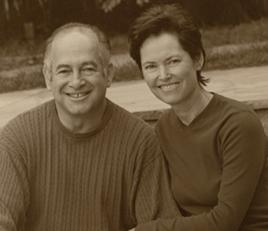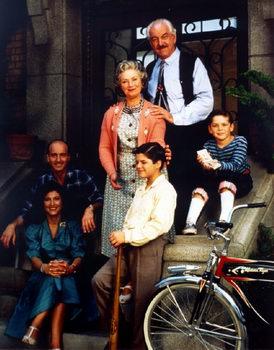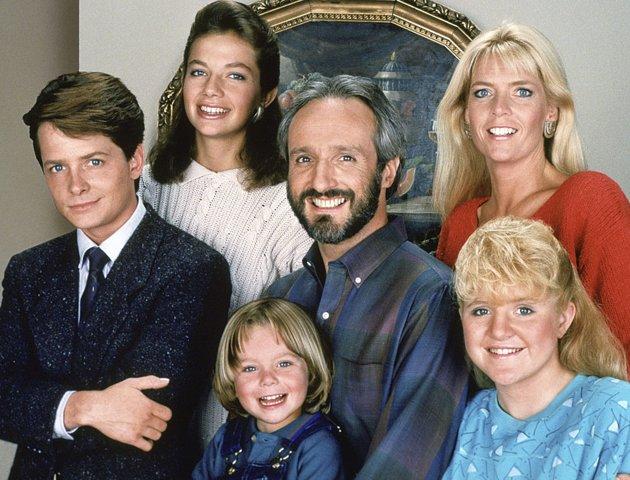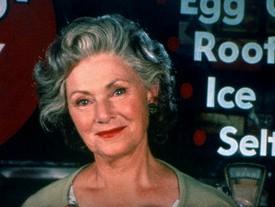Editor's Note: For years, TV Worth Watching has campaigned to have Gary David Goldberg's semi-autobiographical series Brooklyn Bridge released on DVD. To honor Goldberg's TV legacy, we're going to try again. Please leave a comment on our official Brooklyn Bridge campaign page to show your support...
The news on Monday of Gary David Goldberg’s passing prompted me to dig out an interview I did with him almost twenty years ago about the state of television at that time. Goldberg was still mourning the loss two years earlier of his short-lived but critically acclaimed CBS comedy Brooklyn Bridge, which was about to be repeated in its entirety by Bravo — then a showcase for high-end quality programming!
My interview with Goldberg proved to be one of the most interesting I have ever done with a producer, not just because of what he had to say, but because the interview was conducted at his very remote Vermont getaway. I was the first journalist Goldberg had invited there, allowing for a rare look at one of television’s most acclaimed executive producers in an environment completely removed from Hollywood. The interview came about as the result of a conversation I had with Goldberg at a Television Critics Association tour in Los Angeles, during which we realized that my family’s Vermont home was located near Goldberg’s “summer place.”
The day of the interview, in August 1994, was one I’ll never forget. It was a relatively easy ride from my family’s home to Bennington, the closest town to the Goldberg getaway, and the directions I had been given were very clear. But once I exited the town and left the main roadway the ride became something else entirely. I eventually found myself on what may be the longest dirt road I have ever traveled — a private drive that took me through open fields and dense woods and at one point through a long dark tunnel.
I had begun to wonder if I was lost, and if I would ever be heard from again. Then a familiar Hollywood icon — familiar, at least, to anyone who watches TV credits — appeared on the side of the road. It was a small, metal likeness of Ubu, the canine trademark of Goldberg’s production company of the same name, with the words American Dreamer (a short-lived Goldberg sitcom that aired on NBC in 1990) painted on it. I knew I was headed in the right direction.
Further up the road, the woods gave way to wide-open acres of rolling fields. On the left, a pond large enough to be described as a small lake shimmered in the afternoon sun. On the right sat Goldberg’s striking summer home, a Revolutionary War-period farmhouse that had been painstakingly restored by his wife Diana. In every direction the view was the same: acres of green grass spreading out to meet the lush, quiet hills that characterize the region. It was the perfect location for a Los Angeles-based television producer and a Manhattan-based journalist to escape from the concerns of the world and engage in conversation, free from any and all distraction. Or so I thought.
As Goldberg greeted me at the doorway to his large, sun-drenched kitchen it was readily apparent that several people were engaged in a passionate conversation in the dining area behind him. One male voice came through with particular clarity: “If we’re going to televise this as a town meeting, I think we should get Jennings!” (He was referring to ABC News anchor Peter Jennings, who passed away in 2005.)

“As a journalist, I think you’ll find this interesting,” Goldberg offered as he made the introductions. Gathered around the table were his wife Diana (right), a documentary producer; Rev. Ronald F. Thiemann, dean of the Harvard Divinity School; associate dean Royal Govain; and Kathy Bonk, a founder and director of Communication Consortium, a Washington, D.C.-based lobbying and media communications group working on behalf of children’s and family issues. They were engaged in a brainstorming session, with the ultimate goal of organizing a world-wide televised town meeting in which leaders from different countries would come together to discuss fundamental human rights issues. Pope John Paul was mentioned, as were Bill Clinton and Nelson Mandela. The Goldbergs were mulling the extent of their possible involvement, with options ranging from simply making the house available for future meetings to becoming involved in the actual production of the event.
It was a loud and lively meeting, so Goldberg steered me toward a quieter place in another section of the sprawling, antique-filled house. It wasn’t exactly an environment in which I expected to encounter a meeting of minds intent on influencing the world, but Goldberg set me straight.
“When you’re here for a long period of time, I think your whole makeup changes,” Goldberg said, sipping coffee and gazing out the window at his back lawn, which sloped down toward a swimming pool, tennis court and basketball court, the latter a Goldberg essential. (He was known for his celebrity-studded, pick-up basketball games on the Paramount lot and elsewhere in L.A.) “It’s quite amazing, because it just gets into you. You start thinking nobler thoughts.”
Meetings as noble in their intent as the one in the other room were not unusual at the Goldbergs’ Vermont home. “Diana makes it available to non-profit groups to have their retreats here,” Goldberg explained. “We have a little barn down below that’s been converted. We feel it’s good to share it. It’s a great place for conflict resolution. If people come here with anger, it just kind of goes away after two or three days. You feel silly being small-minded and petty around these beautiful trees and hills.”

I could only imagine that these attributes had served Goldberg well one year earlier, when his beloved CBS series Brooklyn Bridge (left) was cancelled after a season-and-a-half of frenzied scheduling and questionable promotional efforts. Like NBC’s I’ll Fly Away, which also premiered at the start of the 1991-92 season and suffered through two years of anemic ratings and ill-advised schedule changes before its cancellation, Bridge was one of the most critically praised series of the Nineties. Many producers are passionate about their creations, but in this case Goldberg had put his own heart and soul on the table: Bridge was a semi-autobiographical look at his own childhood in the Brooklyn of the Fifties.
“I was a maniac, in terms of control of it,” he laughed, recounting a story of how he once noticed that three frames of footage were missing from the end of a scene, when even the computerized editing equipment hadn’t detected it. When Bridge was cancelled, Goldberg publicly railed against CBS and the state of broadcast network TV in general. In fact, he declared that he would never work in the medium again. (This was several years before Spin City, Goldberg’s next and last major television success.)
“That was certainly a very angry and hurt response, from an angry and hurt person,” he told me. “When Brooklyn Bridge was cancelled, [then-CBS Entertainment president] Jeff Sagansky said to me, ‘Let’s do another project together.’ That struck me as so odd. It was just like, your spouse has just passed on, and someone says, ‘Do you want to go out on a date?’ It doesn’t work that way. I was in mourning for quite a while. I’m out of that now.” Goldberg was quick to add that he continued to hold Sagansky in high regard, saying that he thought it was actually quite daring of him to put Bridge on the air “and give us the creative freedom that we did have."
According to Goldberg, Brooklyn Bridge suffered not so much as a result of the actions of any one group of people, but as a consequence of the cold-hearted realities of network television.
“[NBC Entertainment president] Warren Littlefield made a mistake putting I’ll Fly Away (right) on the air,” he declared. “Jeff Sagansky made a mistake putting on Brooklyn Bridge, because it wasn’t Step By Step or Full House or any of those other shows that went on to long-term success. Nobody cares about the fact that I’ll Fly Away really influenced people, maybe started people thinking differently. Nobody said to Warren, ‘Hey! Great show! Thanks for putting it on. It has really opened the debate about who we are, where we were in the Sixties, how we are as a culture.’ All they said was, ‘You’re losing the time period here.’”
Goldberg sighed. “Once you accept that profit is the motive for everything, that allows a whole range of very cowardly behavior on your part,” he asserted. “People can say, ‘Well, I know it’s bad, but people want to watch it and we make money from it.’ But it doesn’t work that way. You go home to the society you’ve now empowered and created.”
Despite his lingering reservations, Goldberg said he might have considered working in broadcast television again, with a caveat or two. “The network television world as it exists has some attraction, but also some repellent aspects to it,” he explained. “My fear is that what I would consider my best work is not necessarily what the networks want to put on, or that the people who are watching right now want to see.” He then caught himself, noting that there were some “lovely examples” of quality programming that were thriving in the climate that had fueled this fear, such as ABC’s NYPD Blue and NBC’s Mad About You and Frasier.

Goldberg had a much longer run with his hit Family Ties (left), which was, perhaps, the definitive Eighties sitcom, chronicling the conflicts between an aging yet still liberal Sixties couple and their children, who can be regarded, in hindsight, as Generation X sprouts. Most of those conflicts centered on their eldest son, proud junior Reaganaut Alex P. Keaton. As portrayed by Michael J. Fox, Alex was as comfortable coming of age in the era of trickle-down economics as his parents were growing up in the Age of Aquarius. When Ties ended, Goldberg felt a sense of rightness, of completion. “There was nothing more to say!” he laughed, thinking back on it.
It’s significant to note that the ratings for the first season of Family Ties in 1982-83 were almost as anemic as those for the first season of Brooklyn Bridge. Goldberg credited then-NBC president Grant Tinker for its salvation and eventual hit status. Without Tinker, he told me, “there wouldn’t have been a second year of Family Ties, nor a second year of Cheers, nor Hill Street Blues, nor St. Elsewhere [all series that began at the same time as Ties, or shortly thereafter].” He said Tinker’s concept was to “put something good on, let the public find it, give it time and take your losses. Grant took that network from No. 3 to No. 1, and the other way of thinking quickly brought it back to No. 3. There just doesn’t seem to be a learning curve on this.” Although clearly somewhat exasperated by network politics, Goldberg readily acknowledged that he had also done quite well by broadcast network TV.
Anemic ratings aside, Goldberg knew Brooklyn Bridge was in trouble as soon as CBS’ scheduling and promotional campaigns kicked in. The real clincher came, he said, when his own brother called one day and asked, “When is Brooklyn Bridge on?” Bridge was first slated to play on Friday after the Fran Drescher sitcom Princesses, “which was cancelled before it even got on,” Goldberg recalled. Bridge was then moved to Wednesday, where it was paired with the Redd Foxx comedy The Royal Family. “I would like to see the genetic makeup of a person who watched both shows,” Goldberg mused. “You’d have to send them in for testing!” Eventually Bridge was moved to Saturday, where it died.
The promotional spots for Bridge really got under Goldberg’s skin. “When they used to do a promo for Brooklyn Bridge and Redd Foxx together, Foxx would basically come in and belch or whatever, and then we’d come on, and it looked like you’d suddenly switched to some satellite channel, gotten Polish PBS,” Goldberg recalled.
By network standards, Goldberg might not have been the right man to talk about series promotion. Consider his comments, delivered to CBS, about the promotional possibilities for I’ll Fly Away. “I had always urged the guys at CBS to promote I’ll Fly Away, even though it was on NBC,” he explained with complete sincerity. “I said, ‘Look, you’re a communication entity. You have a personal relationship with your audience. You’re there to serve them and nurture them in that way. Go out and say, ‘We’d like to call your attention to a real quality piece of work being done on another network. We wish we had come up with it, but we didn’t. As a service to you and your family, we just want to make you aware of it.’”
While the clean air and calming quiet of Vermont can certainly alter one’s consciousness, back in Los Angeles this logic would have been described as near-delirium. “It didn’t go over big,” Goldberg admitted. Still, he told me this story to make a point; perhaps the kind of point on which one had to meditate in the mountains to formulate with such completeness. “I think consumers are desperate for some personal relationship with their media outlets,” he said, somewhat prophetically. “Someone is going to come along and redefine what that relationship is, treat people with some respect, and they’re going to really reap some big economic rewards for it.”

In a perfect world, the kind of world one fantasizes about in a rocking chair on a Vermont porch, Goldberg said he’d like to see Bridge resurrected on a pay-per-view basis. “We were in the wrong delivery system,” he suggested. “‘What’s really hard to grasp is, Brooklyn Bridge had about 7 million viewers, while an average primetime night for CNN has what, five hundred thousand?
“It’s not a crazy idea,” he insisted. “What would I pay for I’ll Fly Away? I pay seven dollars to go to a movie. I would certainly pay seven dollars a month to have I’ll Fly Away available to my family.” Goldberg speculated that with enough audience support, the cost of purchasing new episodes of Brooklyn Bridge could have been as low as 50 cents per month, or maybe less.
“All the anecdotal evidence was leading us to believe that we were really having an impact,” a wistful Goldberg recalled. “I thought it would really grow. I will always believe, had they left our show in one place that it might have.
“I probably have a very limited credibility here, because every producer who’s ever had a show cancelled, from My Mother the Car to Hill Street Blues, has said the same thing,” Goldberg concluded. “But it did seem like something was happening and was cut off. There will always be a part of me that feels I didn’t get a chance to complete the job.”